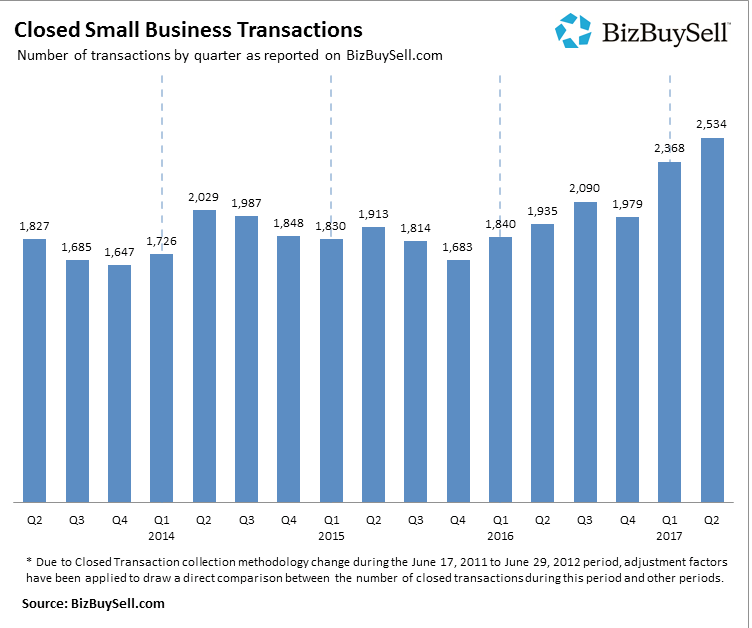
A Few Simple Keys To Improving Your Business Value
The first key in determining business value, is to have your accountant take a look at your accounting procedures and make recommendations on how to improve them. He or she may also help in preparing financial projections for the coming year(s). Getting your company’s financial house in order is very important in establishing the value of your firm.
The second key is to review the reputation, image, and marketing materials of your company. Certainly, the quality of your product or service is paramount, but how your firm presents itself to customers, clients, suppliers, etc. – and the outside world – is also very important. The appearance of your facilities and customer services – beginning with how people are treated on the telephone or in the waiting/reception area – are the kind of first impressions that are critical in dealing with your customers or clients. Don’t forget about the company’s Web site; in many cases, it is the initial introduction to your company. Now may also be the time to update your marketing materials. The image of a company can help create a happy workforce, improve customer service, and impress those that you deal with – all of which can increase the value.
A third key is to get rid of outdated inventory – sell off any extra assets such as unused or outmoded equipment. The proceeds can be used in the business. If there are any assets that should not be included in the value of the company, such as personal vehicles or real estate, you might want to separate them from the assets of the company. This is especially important if you are considering placing the company on the market. A prospective purchaser expects everything they see to be included in the sale. If a portrait of your grandfather is your personal property, delete it from any list of company furniture, fixtures, and equipment; and if the business is for sale, remove it entirely.
Another important key is to resolve any pending items. For example, if the company has a trademark on any of the important products, and the paperwork for registering is sitting on someone’s desk, now is the time to complete the filing. Trademarks, patents, copyrights, etc., can be very valuable, but only if they have been properly recorded and/or filed.
Contracts, agreements, leases, franchise agreements, and the like should be reviewed. If they need to be extended, take the appropriate action. A contract with a customer has value and if it is scheduled to expire soon, why not get it renewed now? The same is true for leases. Favorable leases for a long period of time can be a valuable asset. Do your key employees have employee agreements?
The key factors outlined above not only build value, but they also increase the bottom line. If you are considering selling your company at some point, these key issues will come back many-fold in the selling price. A professional business intermediary can help with other factors that can influence the value of the business.
One other hidden benefit of building the value of your company is that you never know when the Fortune 500 Company will come “knocking at your door” with an offer that you can’t refuse. At that point, it’s probably too late to work on some of the issues mentioned above.
Copyright: Business Brokerage Press, Inc.
Read More
BizBuySell Reports Number of Small Business Sold Transactions Hits Record Levels 1st Half of 2017
BizBuySell.com’s Second Quarter 2017 Insight Report indicates 2017 is on track for a record-breaking year of small business sales as deals close faster. A total of 2,534 closed transactions were reported in the second quarter of 2017, a 31 percent increase from this time last year. This brings the year-to-date total to 4,902 closed transactions. If this pace holds up, 2017 will easily surpass 2016, when BizBuySell reported a then record 3,775 transactions in the first half of the year.
Below are a few highlights from the report:
- Businesses sold in Q2 saw an increase of 11% in median revenue
- For the same quarter, median cash flow increased 10.5%
- Average multiple of cash flow increased 5.1%
- Median asking price for closed deals increased 12.6%
- Sales to asking price remained at a consistent 92%
- Total listings increased 13% year over year
- Restaurants saw the largest increase in activity up 34% in closed transactions
“Our recent conversations with brokers and previous research shows both buyers and sellers are confident in today’s business-for-sale environment,” said Bob House, president of BizBuySell.com and BizQuest.com. “This streak of record-number transactions confirms this sentiment and suggests many are capitalizing on today’s hot market.”
Source: BizBuySell 2017 Q2 Insight Report
Read MoreOne Way To Decide When To Sell Your Business
How do you know the right time to sell your company? One answer to this age-old question is that the time to sell is when someone else is willing to invest more in your business than you are.
When you start a business, nobody is willing to invest in its success more than you. You’ve already worked a 40-hour week by Wednesday and, if you’re like most founders, you’ve invested a big chunk of your liquid assets in getting your business going.
You’re all in.
In the early days, you are willing to risk your business on a new strategy because the business is pretty much worthless. As the Bob Dylan lyric goes, “When you ain’t got nothing, you got nothing to lose.”
As your business grows and becomes more valuable, you may find yourself becoming more conservative, unwilling to risk the equity you have created inside your business on your next big idea. You have reached a point where someone else may be willing to risk more time and money for your business than you are.
Peach New Media
David Will is the founder of Peach New Media, which he started back in 2000 as a reseller of web conferencing. In the early days, Will changed his business strategy frequently, trying to find an idea with legs. After a number of pivots, he landed on selling learning management software to associations.
The business grew nicely and by 2015 Peach New Media had 40 employees and then received an attractive acquisition offer from a large private equity company. Will was conflicted. He loved his business and treasured the team he had built. At the same time, the acquirer was offering him a life-changing check.
In the end, Will realized that he had become somewhat more conservative as his business had grown and the potential acquirer was willing to make a big bet on integrating Peach New Media into another one of its acquisitions. Will realized he had reached a point where his appetite for risk in his own business was lower than his potential acquirers. Will decided to sell.
When To Sell
The point where a buyer is willing to risk more than you are happens at a different stage for everyone. Let’s say you have a business worth $1 million today. Would you be willing to risk the entire thing on a new strategy for a shot at making it a $10 million company? Many entrepreneurs would take that bet.
Now imagine you have a company worth $10 million and your business represents the bulk of your net worth. Most would argue $10 million is life-changing money. Would you be willing to risk your entire company for a chance to make it a $100 million company? The marginal utility of an extra $90 million is minimal—we all only need so many cars—but the risk is significant. Fewer owners would bet $10 million for a chance at $100 million.
What if your business was worth $100 million? Would you risk it all for a long shot at becoming a billion-dollar company? It is hard to imagine any one person betting $100 million dollars on anything, but if you’re the CEO of a billion-dollar corporation with ambitious growth goals, $100 million is a bet you may be willing to make.
When someone else is willing to invest more in your business than you are, it is probably time your company finds a new owner.
Read More